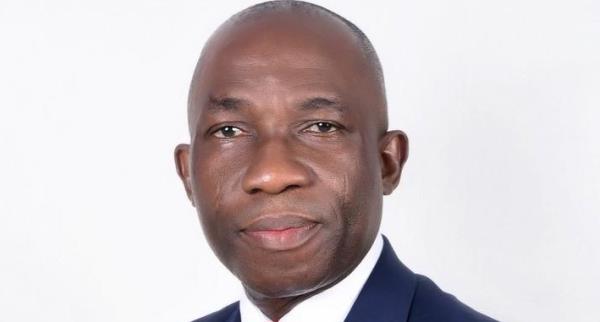Broadcasting
NCC Canvasses More Access to Learning Materials for the Blind

Dr. John O. Asein, director-general of Nigerian Copyright Commission (NCC), has called for affirmative action to ensure more access to learning materials in accessible formats for blind, visually impaired and print disabled persons in line with the Discrimination Against Persons With Disabilities (Prohibition) Act, 2018 and the Marrakesh Treaty which the country ratified in 2017.

Dr. Asein made the call in Abuja recently when the President, Association of Lawyers with Disability in Nigeria (ALDIN), Mr. Daniel Onwe and Director of Anglo-Nigerian Welfare Association for the Blind (ANWAB), Mr. Danlamin Basheru paid a visit to the Commission recently.
The Director-General who lauded President Muhammadu Buhari and the National Assembly for their political will in bringing about the enactment of the Disabilities Prohibition Act, expressed hope that the Executive Copyright Bill recently transmitted to the National Assembly would be enacted into law to facilitate the exceptions provided for print disabled persons under the copyright system.
He called on all stakeholders, particularly publishers and agencies responsible for the provision of books and learning materials to school children, to take proactive steps by insisting on the provision books in accessible formats to blind and print disabled persons.
The Director-General reiterated the Commission’s commitment to championing the course of visually impaired and print disabled persons to ensure the removal of discrimination against them in the provision of learning and education materials.
He said this would further assist in delivering on Government’s policy of inclusiveness at all levels and help to harness the full potentials of all Nigerians, irrespective of their physical challenges.
In his words, “Every human being has one challenge or the other and no one should be locked out of learning and education facilities merely on account of his or her peculiar physical condition.
“The Commission is duty-bound, as part of its broader responsibility as an agency in the forefront of the knowledge ecosystem, to ensure that all Nigerians have equal opportunity to be the best they could be for the benefit of our dear country.”
Noting that less than one per cent of books were available in formats that blind and visually impaired persons could read unassisted, Dr. Asein appealed to authors and publishers to imbibe the practice of making their books “born accessible”.
To this end, he called on lawyers with disability to partner with the Commission in the campaign to make it easier for blind and visually impaired children to read, stating that this would ensure that more of them remained in school.
In his remarks, the President of ALDIN, Mr. Onwe stated that as the umbrella body of lawyers with disabilities in Nigeria and those in diaspora, the Association was involved in advocacy for access to justice for the disabled and the enactment of the law prohibiting discrimination against persons with disabilities in the country.
According to him, the visit to NCC was part of the Association’s drive for partnerships to ensure that books and educational materials were accessible to persons with disabilities.
He added that ALDIN’s engagement of relevant organisations has enabled it in providing a voice for its members in various forums such as the Nigerian Bar Association (NBA) and the courts. He assured the Director-General of ALDIN’s support for the Commission’s various programmes to alleviate the plight of the blind.
In his contribution, the Director of ANWAB, Mr. Danlami Basharu, stated that ANWAB was committed to the welfare of the blind, teaching them to read and write using Braille, typewriters and computers.
He explained that the organisation has facilities to aid the production of books in brail, with libraries for accessing brail books while helping blind persons to be more independent.
Mr. Basharu promised that ANWAB would assist in transcribing the Executive Copyright Bill into brail for the benefit of the blind.
He expressed appreciation to the Commission for its sustained support for the blind and commended it on the recent reform of the copyright system to accommodate the needs of the blind, visually impaired persons and those who are otherwise print disabled as enshrined in the Marrakesh Treaty.
Broadcasting
Lagos Dominates NIN List as Nigeria Hits 117 Million Registrations

National Identity Management Commission (NIMC) has announced a milestone achievement, with over 117 million Nigerians now enrolled for the National Identity Number (NIN) as of February 28, 2025.

Lagos State emerged as the top contributor to this figure, boasting over 12.6 million registrations, followed by Kano State with 10.2 million.
According to NIMC’s latest data, male registrants outnumber female registrants, making up 56.5% of the total enrollment at 66,281,803, while female registrants account for 43.5% at 51,079,521.
The report highlighted regional enrollment trends, showing an almost equal distribution across Nigeria’s northern and southern regions.
However, Bayelsa, Ebonyi, and Ekiti States recorded the lowest enrollment figures, with Bayelsa reporting a mere 758,111 registrations.
Lagos State dominated the charts with 6,870,915 males and 5,741,419 females registered, while Kano trailed closely, boasting 5,924,126 males and 4,321,929 females in its 10.2 million total registrations.
Other notable states in the top 10 include Kaduna, Ogun, Oyo, Katsina, and Rivers. NIMC expressed optimism about further improving enrollment figures in underrepresented regions in the coming months.
Broadcasting
DStv Revenue Plunges as MultiChoice Loses Nearly 4m Subscribers

MultiChoice, Africa’s leading entertainment provider and operator DStv, has warned shareholders to brace for tougher times as the company struggles in a challenging economic climate.

MultiChoice has seen its DStv subscribers decline from over 23 million to 19.3 million in less than two years.
A huge portion of the subscriber loss happened outside its home of South Africa.
In an earlier statement, MultiChoice attributed the steep decline to economic pressures in key markets, particularly Nigeria.
“The loss in the rest of Africa has been primarily due to the significant consumer pressure in Nigeria, where inflation has remained above 30% for the majority of the last 12 months and, more recently, due to extreme power disruptions in Zambia,” the company said.
The company’s latest voluntary operational update, released in preparation for its financial results for the year ending March 31, 2025, reinforces the severity of its current challenges.
MultiChoice noted that the “challenging consumer environment has resulted in a decline in subscribers and limited revenue growth,” underscoring the financial strain faced by the company.
This development came amid increasing regulatory scrutiny, with Nigeria’s Federal Competition and Consumer Protection Commission (FCCPC) recently filing charges against MultiChoice for allegedly violating local regulatory directives.
Broadcasting
Court Fixes May 8 for Judgment in MultiChoice, FCCPC Dispute over Price Hike

Justice James Omotosho of the Federal High Court in Abuja has fixed May 8 for judgment in the suit filed by MultiChoice Nigeria Limited against the Federal Competition and Consumer Protection Commission (FCCPC).

Justice Omotosho fixed the date after lawyers representing the parties adopted and argued their written addresses for and against the suit.
The court had earlier restrained the Commission from taking “any administrative steps” against the plaintiff following an increase in the service price of two of its brands; DStv and GOtv.
The restraining order was a sequel to a formal request by MultiChoice seeking the court’s protection from planned sanction from the FCCPC, over the increase in the price of DStv and GOtv.
At the proceeding, the court granted the Commission’s request for an extension of time to regularise its processes and also allowed the plaintiff to withdraw its application for interlocutory injunction which has been overtaken by event.
Arguing its case, MultiChoice through Moyosore Onigbanjo, SAN, its lead counsel, submitted that the bone of contention is “whether the defendant have the right to control the price at which the plaintiff offers its services to the public.”
While acknowledging the regulatory powers of the Commission, the senior lawyer argued that the Act establishing the FCCPC did not confer on it the powers to regulate price or prevent anyone including the plaintiff from increasing its prices.
Besides, Onigbanjo stated that the issue of whether the defendant can regulate price has been litigated before between the two parties, adding that the Tribunal had held that the Commission has no powers to regulate prices of goods and services in the country, except the President of the Federal Republic of Nigeria.
The Plaintiff’s lawyer also submitted that even the president who is clothed with the powers to regulate prices has maintained “that his government does not believe in price control” but, that prices are determined by market forces of demands and supplies.
The plaintiff in addition submitted that if the FCCPC has no powers to control price “where does he have the powers to prevent the plaintiff from increasing price.
MultiChoice subsequently accused the Commission of discrimination, stating that all businesses in the country have been increasing their prices in line with economic conditions and inflation without the Commission raising an eyebrow, save with the plaintiff.
He, therefore, urged the court to grant all the reliefs sought in the suit.
While adopting his counter affidavit in opposition to the suit, Professor Joe Agbugu, SAN, lead counsel for the defendant, urged the court to first address the cause of action; which is the the issue of increase in the price of DStv and GOtv.
Agbugu disclosed that the Commission on February 25, wrote the plaintiff after it announced price increase effective from March 1, 2025.
According to the senior lawyer, MultiChoice was summoned to appear before the Commission on February 27, “they wrote that it was not convenient and proposed March 6. We then said that in the interim they should hold on with the price increment.”
Agbugu further stated that, “there was no issue of price regulation or fixing as at the time the action commenced.”
Besides, he claimed that the statute establishing the FCCPC, gave it “powers to check exorbitant pricing” and also powers to “regulate abuse of dominant position in the market” as it relates to prices and passing of cost to the consumer.
“The plaintiff occupies a dominant position in the television and entertainment,” Agbugu claimed, adding that the case before the court is not of price regulation but the powers of the Commission to investigate prices that are deemed exploitative and abuse of dominant position.
“The Commission is not to tell you to use price A or B but to determine that the price is exploitative” he said, “they ran away to be investigated over their planned action.
“Our action is not about price fixing; the issue is about whether the price is exorbitant…the mandate of the Commission is to protect the consumer.”
Reacting to the claim of discrimination, defendant’s lawyer, submitted that, “abuse of dominant position qualified them to be singled out for exorbitant pricing.”
Agbugu subsequently urged the court to strike out the suit and dismiss it because it attacks the major task of the Commission of protecting consumers.
“The suit should be dismissed and the plaintiff returned to us for investigation,” he added.
Responding, Justice Omotosho announced that, “judgment is reserved to May 8.”

 Telecom3 days ago
Telecom3 days agoMTN, Lynk Global Make Africa’s First Satellite-to-Mobile Call

 E-Business3 days ago
E-Business3 days agoSystemSpecs’s Subsidiary Deelaa Becomes Whatadeal

 E-Financial3 days ago
E-Financial3 days agoNigeria Gets Fresh $500m World Bank Loan for Economic Stimulus Programme

 Broadcasting2 days ago
Broadcasting2 days agoDStv Revenue Plunges as MultiChoice Loses Nearly 4m Subscribers

 General News3 days ago
General News3 days agoSERAP Asks National Assembly to Drop Bill to Jail Nigerians who Fail to Vote

 E-Financial3 days ago
E-Financial3 days agoUninsured Depositors of Heritage Bank to Receive Liquidation Dividends In April – NDIC

 Telecom3 days ago
Telecom3 days ago15-Year-Old Autistic Artist, Kanye, to Unveil World’s Largest Art Canvas on Autism Awareness Day

 Telecom3 days ago
Telecom3 days agoSmart Treasure Investment Team’s Initiatives Eradicate Poverty, Says Aminu



























